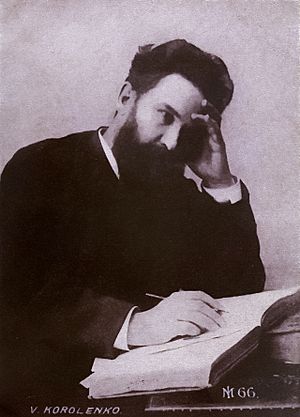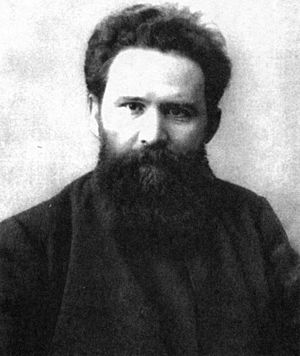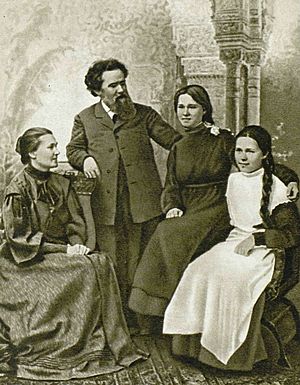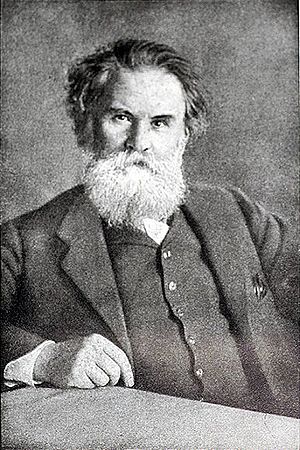Vladimir Korolenko facts for kids
Quick facts for kids
Vladimir Korolenko
|
|
|---|---|
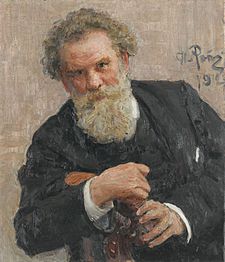
Portrait by Ilya Repin
|
|
| Born | Vladimir Galaktionovich Korolenko 27 July 1853 Zhitomir, Volhynian Governorate, Russian Empire |
| Died | 25 December 1921 (aged 68) Poltava, Ukrainian SSR |
| Signature | |
Vladimir Galaktionovich Korolenko (Russian: Влади́мир Галактио́нович Короле́нко, Ukrainian: Володи́мир Галактіо́нович Короле́нко; 27 July 1853 – 25 December 1921) was a famous writer, journalist, and activist from Ukraine. He was known for fighting for human rights and helping people in need. His most famous book is The Blind Musician (1886). He also wrote many short stories about his time living in Siberia after being sent there by the government. Korolenko was a strong critic of the old Russian government (the Tsarist regime) and later of the Bolsheviks.
Contents
About Vladimir Korolenko
Early Life and Family
Vladimir Korolenko was born in Zhytomyr, Ukraine, which was part of the Russian Empire at the time. His father, Galaktion Afanasyevich Korolenko, was a judge known for being very honest. His mother, Evelina Skórewicz, was of Polish background.
When he was very young, Vladimir learned to read Polish before Russian. After an event called the 1863 January Uprising, his family decided to identify as Russians. His father died suddenly in 1866, and his mother worked hard to raise their five children.
School and First Exile
Vladimir went to school in Zhytomyr and later in Rovno, where he finished with good grades. He loved reading works by famous Russian writers like Nikolai Nekrasov and Ivan Turgenev. He felt that Russian literature was his "true native land." He also found inspiration in Taras Shevchenko and Ukrainian folklore.
In 1871, Vladimir started studying at the Saint Petersburg State Institute of Technology. However, he had to leave in 1873 because he didn't have enough money. In 1874, he moved to Moscow and joined the Moscow College of Agriculture and Forestry. He was kicked out in 1876 for signing a letter that protested the arrest of another student. Because of this, he was sent away to live in Vologda and then Kronstadt.
In 1877, Korolenko enrolled in the Saint Petersburg Mineral Resources Institute. He became part of a group called the Narodniks, who wanted to help ordinary people. He was arrested again and sent to live in different places, including Vyatka, Vyshnevolotsky District (where he was jailed), and Tomsk. Finally, he was allowed to settle in Perm.
Writing Career
Korolenko's first short story, "Episodes from the Life of a Searcher," was published in 1879. It was about a young Narodnik trying to find his place in society. Another early story, "Chudnaya" (Weird Girl), was written while he was in prison. It became very popular and was passed around Russia in handwritten copies before being published in London in 1893.
In 1881, while in Perm, Korolenko refused to promise loyalty to the new Russian Tsar Alexander III. This was after Tsar Alexander II had been killed. Because of his refusal, Korolenko was sent into exile again, this time much farther away to Yakutia. He spent three years in a small village called Amga. There, he did manual labor but also learned about the local customs and history. His experiences in exile gave him many ideas for his stories.
In 1885, he was finally allowed to settle in Nizhny Novgorod. His story "Makar's Dream," about a dying peasant's dream of heaven, made him famous when it was published that year. It was later translated into English.
His first collection of stories, Sketches and Stories, came out in 1886. It included "In Bad Company" (also known as "Children of the Underground" for younger readers) and "The Wood Murmurs." In the same year, he published the short novel Slepoi Muzykant (The Blind Musician), which was reprinted many times.
Korolenko's second collection, Sketches and Stories (1893), included more stories about Siberia and also tales inspired by his travels along the Volga and Vetluga regions. The famous writer Anton Chekhov praised one of his Siberian stories, "Sokolinets," calling it "the most outstanding" story of its time.
After visiting an exhibition in Chicago in 1893, Korolenko wrote "Bez yazyka" (Without Language, 1895). This story was about an uneducated Ukrainian farmer struggling in America because he couldn't speak English.
In 1896, Korolenko moved his family to Saint Petersburg. However, he suffered from stress and trouble sleeping, so he returned to Poltava in 1900. There, he wrote more stories and published his third volume of Sketches and Stories in 1903. By this time, he was a well-known Russian writer. He was a member of the Russian Academy of Sciences but resigned in 1902 when Maxim Gorky was removed from the Academy for his revolutionary activities. Anton Chekhov also resigned for the same reason.
In 1905, Korolenko spoke at meetings in Poltava to stop attacks against Jewish people. He also spoke out against the government's actions during the Sorochynsky tragedy of 1905. He gave a speech in 1911 at the opening of a monument to Mykola Gogol. He wrote a series called "Domestic Phenomenon" to oppose military courts and many death sentences.
In 1905, he started writing a long autobiography called The History of my Contemporary. The first part was published in 1910, and the rest came out after he died in 1922. In 1914, his complete works were published.
Journalist and Activist
Fighting for Human Rights
Throughout his life, Korolenko used his writing to fight for human rights and against unfairness. He saw himself as "only a part-time-writer" because he spent so much time on important public issues.
In 1891-1892, when many parts of Central Russia faced a terrible famine, Korolenko went to help. He collected donations, made sure food was delivered, and opened free canteens (soup kitchens). He also sent reports to newspapers, which were later put into a book called V golodny god (In the Year of Famine, 1893). In this book, he described the terrible things he saw and explained why the crisis happened.
In 1895-1896, he spent a lot of time helping a group of Udmurt farmers who were falsely accused of ritual murders. Korolenko wrote constantly for many Russian newspapers and summarized his experiences in "The Multanskoye Affair" (1896). He made sure the whole country knew about the trial, showed how the accusations were false, and even acted as a lawyer in court. He almost single-handedly helped the farmers be found innocent. Because of his efforts, the village of Stary Multan was later renamed Korolenko village in his honor.
His historical description of the Chișinău pogrom (an attack on Jewish people) in 1903 was banned by Russian censors. It was finally published in 1905 and also in English. When the 1905 Revolution began, Korolenko spoke out against violent groups in Poltava. He received many death threats, and workers had to guard his apartment.
From 1906, he led a campaign against military law and the death penalty. He strongly criticized the government's harsh actions in his writings like "Everyday Phenomenon" (1910) and "In the Pacified Village" (1911). Leo Tolstoy praised "Everyday Phenomenon," saying it should be printed millions of times because of its powerful message. It was published abroad in several languages.
In 1913, he strongly opposed the anti-Jewish Beilis trial and wrote a powerful essay called "Call to the Russian People in regard to the blood libel of the Jews" (1911–13). Korolenko never joined a political party, but his ideas were similar to those of the Popular Socialists.
Last Years and Legacy
Vladimir Korolenko was always against the Tsar's rule and called himself a "party-less Socialist." He cautiously welcomed the Russian Revolution of 1917, seeing it as a natural outcome of history. However, he soon began to criticize the Bolsheviks as their rule became harsh. During the Russian Civil War, he spoke out against violence from both the 'Red' (Bolshevik) and 'White' (anti-Bolshevik) sides.
While in Poltava during the Civil War, he risked his life to save Bolsheviks arrested by the 'whites.' He also asked the 'reds' not to use terror, arguing that moving towards Socialism should be based on the "better sides of human nature." Until his death, he collected food for children in cities affected by famine and helped organize orphanages and shelters for homeless people. He was made an honorary member of the Save the Children League.
Vladimir Korolenko died in Poltava, Ukraine, from complications of pneumonia on 25 December 1921.
Family Life
Vladimir Korolenko had two brothers and two sisters. His third sister, Alexandra, died young.
In January 1886, Vladimir Korolenko married Evdokiya Semyonovna Ivanovskaya. She was also an activist who had been arrested and exiled. Their marriage was very happy. They had two daughters, Natalya and Sophia (two other children died as babies).
Natalya Lyakhovich-Korolenko (1888—1950) became a language and literature expert. She helped edit some of her father's books after his death.
Sofia Korolenko (1886—1957) worked as a school teacher and later became her father's personal secretary. After his death, she helped create the Korolenko Museum in Poltava and was its director for many years. She also wrote a book about her father, continuing his autobiography.
Impact and Recognition
Many people, including the critic D.S. Mirsky, considered Korolenko one of the most important writers of his time. Mirsky said that if it weren't for Anton Chekhov, Korolenko would have been the most important writer and poet. Critics often praised his "wonderful humor" and his ability to describe nature beautifully.
Semyon Vengerov noted that Korolenko's writing blended the "colorful romanticism" of Polish writers with the "poetic soulfulness" of Ukrainian and Russian writers. He was also praised for his vivid descriptions of Northern Russia and his deep understanding of people.
Many critics believed that Korolenko's work as a social activist was just as important as his writing. He was called Russia's "social and literary conscience." Maxim Gorky said that Korolenko did a lot to "awaken the sleeping social self-awareness of the majority of Russian nation."
Yuly Aykhenvald noted that Korolenko was deeply loved because his life and his writings were in harmony. He was always ready to speak out against injustice.
Ongoing Influence
Korolenko is still considered a major Russian writer from the late 19th and early 20th centuries. The Russian singer and literature student Pavel Lion adopted the stage name Psoy Korolenko because he admired Korolenko's work.
A minor planet called 3835 Korolenko, discovered in 1977, is named after him.
Selected Works
- Son Makara (1885) translated as Makar's Dream (1891)
- Slepoi Muzykant (1886) translated as The Blind Musician (1896–1898)
- V durnom obshchestve (1885) translated as In Bad Company (1916)
- Les Shumit translated as The Murmuring Forest (1916)
- Reka igraet (1892) The River Sparkles
- Za Ikonoi After the Icon
- Bez Yazyka (1895) or Without Language
- Mgnovenie (1900) or Blink of an Eye
- Siberian Tales 1901
- Istoria moego sovremmenika or The History of My Contemporary (an autobiography, 1905–1921)
- Тени (1890) or The Shades, available through Project Gutenberg
Famous Quotes
- "Human beings are to happiness like birds are to flight, but happiness is not always for them." (from Paradox)
- "Violence feeds on submission like fire feeds on dry grass." (from Story about Flora, Agrippina and Menachem)
- "It is better to abuse freedom than to have none."
Images for kids
See also
 In Spanish: Vladímir Korolenko para niños
In Spanish: Vladímir Korolenko para niños
 | James Van Der Zee |
 | Alma Thomas |
 | Ellis Wilson |
 | Margaret Taylor-Burroughs |


